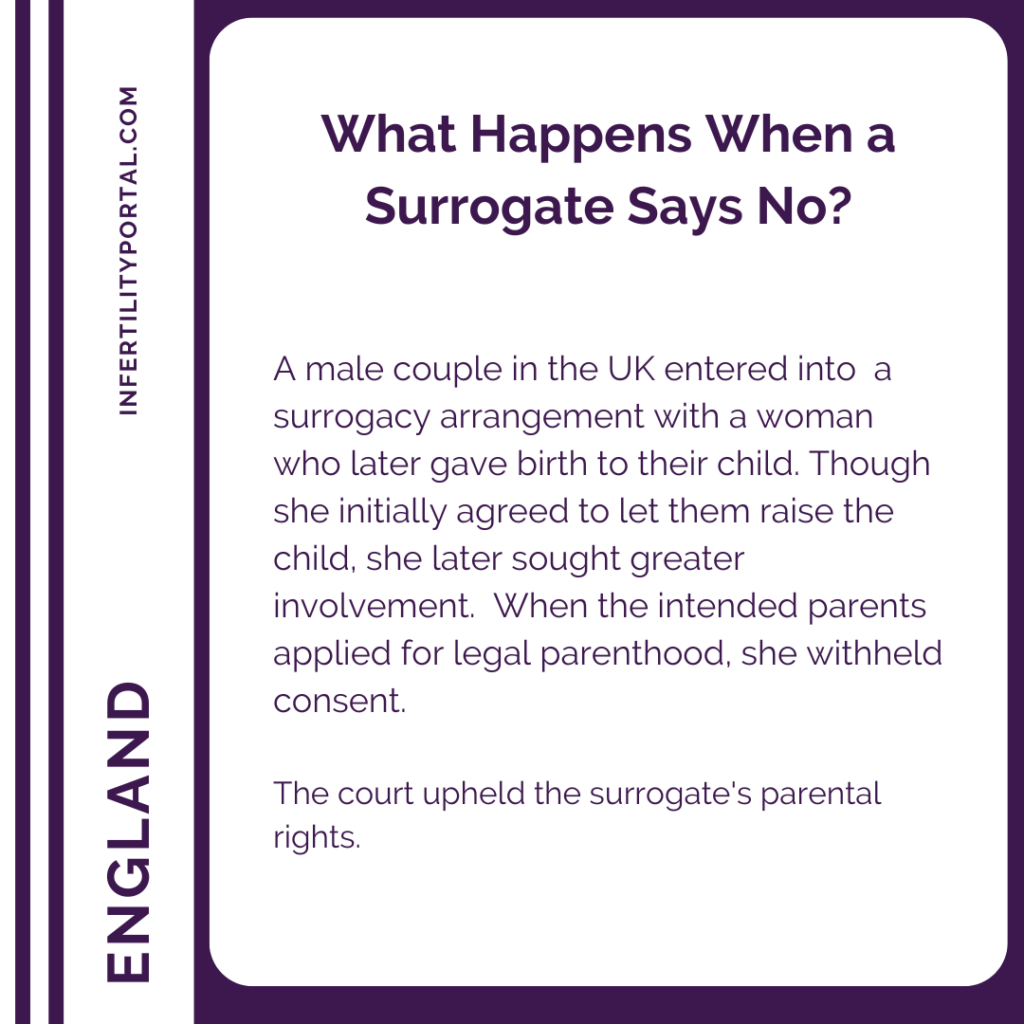Two recent UK court decisions—Re C (Surrogacy: Consent) [2023] EWCA Civ 16 and Re Z (Surrogacy: Step-Parent Adoption) [2024] EWFC 20 — have brought renewed attention to the complex and often fragile legal status of intended parents in surrogacy arrangements. These cases involved a same-sex male couple and a traditional surrogate and demonstrate just how critical biological ties can be in determining legal parentage in the UK.
Background
In 2019, a male couple entered into a traditional surrogacy agreement in the UK. The surrogate conceived using her own egg, making her the biological mother of the child, “Z.” Initially, all parties agreed that the intended parents would raise the child, and the surrogate consented to a parental order, transferring legal parentage.
But the situation shifted.
After Z’s birth, the surrogate sought more involvement in the child’s life — more than the intended parents were comfortable with. This disagreement escalated into a legal battle over parental rights.
Re C (Surrogacy: Consent) – Court of Appeal, January 2023
In August 2021, a parental order was granted to the intended parents. However, the surrogate later withdrew her consent, arguing that it was conditional on maintaining specific contact with the child. Because UK law requires freely and unconditionally given consent from the surrogate, the Court of Appeal sided with her. In January 2023, it revoked the parental order and reinstated her as the legal parent.
Re Z (Step-Parent Adoption) – Family Court, January 2024
Following the loss of the parental order, the non-biological father (the partner of the biological father) applied for a step-parent adoption to secure his legal status. The surrogate opposed the application, wanting to preserve her role in the child’s life.
In January 2024, the court declined to grant the adoption, stating that the surrogate’s refusal to consent could not be overridden. Instead, it issued a “lives with” order, allowing the child to reside with the intended parents and granting the non-biological father parental responsibility, but not full parental rights.
What If This Had Been a Gestational Surrogacy?
These outcomes hinged heavily on the surrogate’s biological connection to the child. If this had been a gestational surrogacy arrangement — in which the surrogate has no genetic link to the child — the legal landscape could have been dramatically different:
-
The surrogate would not be the biological mother, weakening her legal standing.
-
Courts may have been more willing to override her lack of consent if it conflicted with the best interests of the child.
-
The intended parents’ biological relationship to the child would have carried greater legal weight.
In short, biology matters—especially in UK surrogacy law. In traditional arrangements, the surrogate’s parental rights are strongly protected. This case illustrates how those rights can supersede even the established caregiving relationship between the child and intended parents.
Key Timeline
-
2019: Surrogacy agreement and birth of Z.
-
August 2021: Parental order granted.
-
January 2023: Order overturned in Re C.
-
June 2023: Step-parent adoption application filed.
-
January 2024: Adoption denied in Re Z.
Takeaway
Under UK law, a surrogate is considered the legal mother of the child at birth, regardless of biology.
Legal parenthood does not transfer to the intended parents until a court grants a parental order, and this requires the surrogate’s full, unconditional consent. If that consent is withheld, the intended parents may face lengthy, costly court proceedings to try to establish their legal rights. These recent cases serve as a strong reminder of the legal risks, particularly in traditional surrogacy arrangements. They underscore the importance of having well-defined legal safeguards from the outset. Any agreement regarding future contact must be clearly documented and respected by all parties.

Key Considerations
Legal Protection
Always consult with a legal expert who specializes in surrogacy arrangements. They will help ensure that all understandings between the parties are clearly documented, reducing the risk of future legal disputes. Provision should also be made for changes in circumstances, such as if the intended parents separate or relocate, either within the country or abroad. No detail is too small. It is highly recommended that the parties role-play various scenarios, discuss each person’s responsibilities, and document both the situation and the agreement reached. This process should be repeated until everyone feels confident that all possibilities have been considered and addressed.
Emotional Clarity
Surrogacy involves complex emotions. While the excitement of finding someone to help grow your family is natural, it is equally important to take the time to document — clearly and in detail — each party’s role in raising the child and any plans for future contact. Intended parents must be honest about expectations from the start. These agreements should be strictly adhered to, even if the relationship between the parties changes or breaks down.



